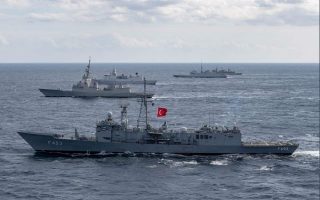Greece can ‘drive agenda’ in Western Balkans, says Atlantic Council’s Damon Wilson

Greece has the opportunity to “drive the agenda” in the Western Balkans and claim its share of the growth a return to normalcy will bring by virtue of its enhanced regional role, according to the executive vice president of the Atlantic Council, a Washington-based foreign policy think tank.
“Greece can become the architect of an EU and NATO strategy, frankly the port of call where Washington can come to think about 'what are we doing next in this region?',” Damon Wilson tells Kathimerini. “That can be totally in Greece's economic, security and political interest. Greece can drive that agenda.”
Addressing the recent chill in relations between Washington and Ankara, which has raised concerns of Turkey drifting further away from its NATO allies, Wilson stresses the “importance of Turkey having strong positive economic relationships with the West.”
“That is where the Turkish economic future is. That is the only strategy bolstering the Turkish middle class,” he says.
“President [Recep Tayyip] Erdogan has been successful as a political leader in Turkey, essentially because he helped deliver tens of millions of people out of poverty into the middle class,” explains Wilson. “What makes that possible? Is it the Turkish relationship with China or Russia? Not really. What's made that possible is that Turkey's economy has further integrated into a global economy, has been liberalized, become competitive. The last thing we want, is to wish ill for the Turkish economy.”
On the subject of American engagement in the Middle East, Wilson says that despite the differences between the administrations of US President Donald Trump and his predecessor Barack Obama, there is “consistency… in wanting to limit American military commitments in the region.”
“For Obama, that translated into dramatic curtailment of our presence in Iraq; for president Trump that's about ending the war against ISIS and our military presence in Syria,” he says.
“It's not just that simple,” however, adds Wilson. “Because of American interests and relationships, it's not realistic to say that the US withdraws. You will see a curtailment, a draw-down of the American military presence, particularly engaging in military action in the region. But we still have a presence.”
“It is wrong to conclude an American political withdrawal,” the analyst says. It's just not going to happen.”





